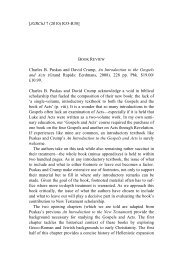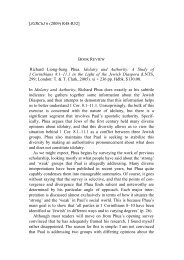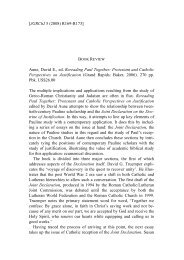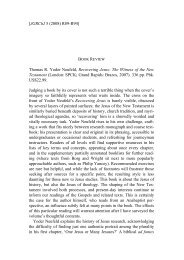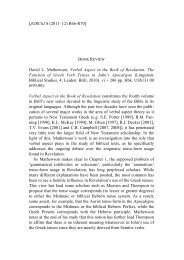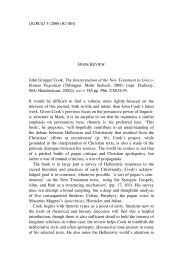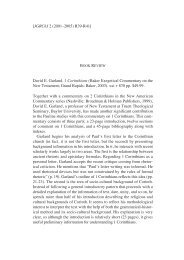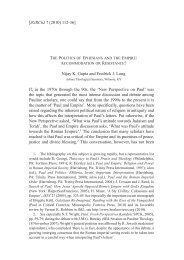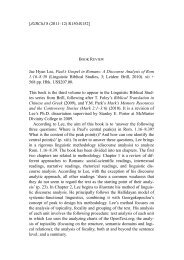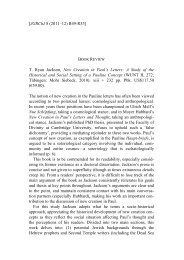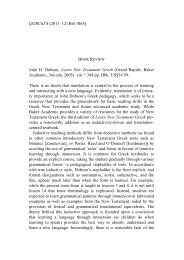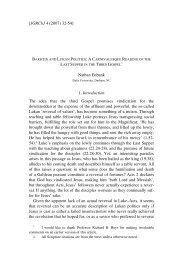Stephen E. Fowl, Philippians - Journal of Greco-Roman Christianity ...
Stephen E. Fowl, Philippians - Journal of Greco-Roman Christianity ...
Stephen E. Fowl, Philippians - Journal of Greco-Roman Christianity ...
You also want an ePaper? Increase the reach of your titles
YUMPU automatically turns print PDFs into web optimized ePapers that Google loves.
[JGRChJ 3 (2006) R79-R81]<br />
BOOK REVIEW<br />
<strong>Stephen</strong> E. <strong>Fowl</strong>, <strong>Philippians</strong> (Two Horizons New Testament<br />
Comment-ary; Grand Rapids: Eerdmans, 2005). x + 254 pp. Pbk.<br />
US$20.00.<br />
The Two Horizons New Testament Commentary Series is a new series<br />
designed primarily for pastors, Christian leaders and students <strong>of</strong><br />
theology who seek to engage in the theological interpretation <strong>of</strong> Scripture.<br />
It is the hope <strong>of</strong> this series to provide a thorough theological<br />
interpretation for New Testament books and complement the modern<br />
exegetical commentaries that are on the market today.<br />
<strong>Fowl</strong> begins his commentary <strong>of</strong> <strong>Philippians</strong> with an introduction to<br />
his understanding <strong>of</strong> what a theological commentary should encompass.<br />
Included within this section is a good explanation regarding the evolution<br />
<strong>of</strong> the commentary genre and the major differences that exist between<br />
a modern commentary and a pre-modern commentary. This<br />
introduction provides the reader insight into <strong>Fowl</strong>’s mindset and the<br />
methodology that he has used in writing this book.<br />
The general structure <strong>of</strong> this commentary is unlike that <strong>of</strong> traditional<br />
commentaries in that it does not have the conventional text-critical, historical<br />
or grammatical sections, but is purely focused on theological reflection.<br />
Although there is no section for historical evaluation, this does<br />
not mean that it is absent from this commentary, but that it is only included<br />
when information on ancient customs and ideas is needed to<br />
develop theological points.<br />
In addition to the commentary, <strong>Fowl</strong> includes one excurses on the<br />
‘hymn’ passage <strong>of</strong> <strong>Philippians</strong>. In this section, <strong>Fowl</strong> calls for a firmer<br />
definition <strong>of</strong> the term ‘hymn’ because it is used so imprecisely. It is<br />
<strong>Fowl</strong>’s belief that if the term ‘hymn’ is properly defined there is insufficient<br />
evidence to support its application to this passage. In addition to<br />
this, there is also a reflection on the relationship between this passage
R80<br />
<strong>Journal</strong> <strong>of</strong> <strong>Greco</strong>-<strong>Roman</strong> <strong>Christianity</strong> and Judaism<br />
and some sort <strong>of</strong> ‘Adam Christology’ and how this passage strongly<br />
asserts Christ’s preexistence.<br />
The commentary concludes with a theological summation <strong>of</strong> what<br />
<strong>Fowl</strong> believes is the overriding theme in the book <strong>of</strong> <strong>Philippians</strong>:<br />
friendship. <strong>Fowl</strong> seeks to expand the notion <strong>of</strong> friendship, not only<br />
within <strong>Philippians</strong>, but also in theology as a whole, by outlining four<br />
topics <strong>of</strong> friendship: friendship based on the character <strong>of</strong> the triune<br />
God, the character <strong>of</strong> God as displayed in different narratives, especially<br />
Phil. 2.6-11, practices <strong>of</strong> friendship in Christian community and the<br />
extraordinary emphasis on joy and rejoicing in <strong>Philippians</strong>. These four<br />
topics evaluate this key theme from a variety <strong>of</strong> different perspectives<br />
and place this concept within the larger theological picture. Overall,<br />
this section provides a fine theological synopsis <strong>of</strong> the book <strong>of</strong> <strong>Philippians</strong><br />
and nicely sums up <strong>Fowl</strong>’s theological comments made<br />
throughout the book.<br />
One <strong>of</strong> the strengths <strong>of</strong> this book is that <strong>Fowl</strong> presents historical<br />
concerns and issues in a way that enhances the study <strong>of</strong> theology, rather<br />
than hindering it. To facilitate this, <strong>Fowl</strong> reads Scripture in light <strong>of</strong><br />
Scripture and allows his understanding <strong>of</strong> <strong>Philippians</strong> to be shaped by<br />
the Bible as a whole, rather than isolating it from its surrounding context.<br />
This is an important characteristic in a theological commentary,<br />
because the book <strong>of</strong> <strong>Philippians</strong> is only one <strong>of</strong> the voices that shape our<br />
understanding <strong>of</strong> God and the nature <strong>of</strong> the Christian faith.<br />
Another strength <strong>of</strong> this commentary is how <strong>Fowl</strong> uses the book <strong>of</strong><br />
<strong>Philippians</strong>, along with the situations and issues that it addresses, to<br />
speak into North American culture in the twenty-first century. There are<br />
a number <strong>of</strong> places where <strong>Fowl</strong> presents a sharp critique <strong>of</strong> North<br />
American individualistic <strong>Christianity</strong> and challenges the reader to reevaluate<br />
their understanding <strong>of</strong> Scripture and their Christian practices in<br />
light <strong>of</strong> Scripture and the theology outlined in Paul’s letter to the <strong>Philippians</strong>.<br />
This blending <strong>of</strong> theology and practice makes this commentary<br />
especially useful for pastors and lay leaders who are looking to apply<br />
the text to daily life and to challenge their congregations to a more<br />
theologically sound interpretation <strong>of</strong> the Bible and its effect on daily<br />
life.<br />
Although there are a number <strong>of</strong> strengths, there is still room for<br />
improvement in a few minor areas. First, although <strong>Fowl</strong> does have a<br />
brief introduction that introduces his methodology, it would have been
Review: FOWL <strong>Philippians</strong><br />
R81<br />
advantageous to include a brief outline and overview <strong>of</strong> <strong>Philippians</strong>, as<br />
well as an explanation <strong>of</strong> how he has divided the text.<br />
Second, because <strong>of</strong> <strong>Fowl</strong>’s desire that this be a commentary that<br />
pastors, lay people and people interested in theology could use, an additional<br />
section outlining further reading materials and other resources for<br />
the different sections would have been beneficial for the reader.<br />
Overall, <strong>Stephen</strong> <strong>Fowl</strong>’s commentary on <strong>Philippians</strong> provides a<br />
detailed theological commentary. <strong>Fowl</strong> does an excellent job <strong>of</strong> highlighting<br />
the theological issues in the text and interpreting their meaning<br />
in light <strong>of</strong> today’s culture. In conclusion, this commentary is not primarily<br />
for those who want to do critical textual or grammatical exegesis,<br />
but is an excellent tool for pastors and people who are interested<br />
in theology and how it can be practically applied to modern North<br />
American culture.<br />
Sean A. Adams<br />
McMaster Divinity College



